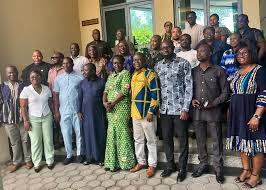The Select Committee on Environment, Science and Technology of Ghana’s Partliament say it is upbeat about the huge socio-economic potential in the carbon market, calling on businesses to tap into its prospects.
The Committee said the country could earn millions of dollars in taxes, fees, direct investment into innovative smart technology, create jobs through development projects for local communities, enhance local air quality, and build resilience to climate change.
The leadership made the call at the end of a two-day training on the progress of Ghana carbon market initiative, organised by the Carbon Market Office (CMO) of the Environmental Protection Authority (EPA)for the committee members.
Mr Yaw Frimpong Addo, the Chairperson of the Committee, urged local businesses to take interest and identify opportunities in the carbon market value chain and participate fully.
“I am still learning about revenue streams the value chain offers and how local business participation will boost the economy. We should not lose our guard like we did in the cocoa sector where the beans are exported and the country makes less revenue,” he said.
“It is sad to know that out of the 70 projects presented to the CMO seeking approval, only about seven are initiatives from Ghanaians with the majority being foreigners. I acknowledge the technicalities involved in the market but the CMO officials are at hand to provide all the explanations businesses will need.”
Mr Addo, who is the Member of Parliament for Manso Adubia Constituency in the Ashanti Region, said the committee members would educate their fellow parliamentarians and constituents on the carbon market and the opportunities it presented to businesses.
The carbon market allows companies and countries to buy and sell carbon credits – permits that represent 1ton of greenhouse gas emissions reduced or removed or avoided from going into the atmosphere.
This system helps countries like Ghana to raise funds and enhance its climate ambition through mitigation activities while contributing to global emission reductions.
A recent report from the Office estimates that Ghana’s carbon market could attract more than one billion dollars in investment by 2030.
Professor Hamza Adam, the Ranking Member of the Committee, described the carbon market as an emerging economy that Ghana was well positioned to rake in revenue to contribute to the transformation of the economy.
He noted that the market was “pregnant” with projects including technology – based solutions such as clean cooking stoves, solar, and nature-based solutions.
“Our youth stand the chance of benefiting from capacity building to render services including conducting monitoring, reporting and verification services (MRV), which hither to would have been sublated to foreigners,” he said.
Professor Nana Ama Browne Klutse, the Acting Chief Executive Officer of the EPA, stated that the carbon market was a huge opportunity to meet global climate obligations while building a resilient economy.
She said the CMO was committed to facilitating the scaling up of projects and increasing local participation in the growing carbon market ecosystem.
One of the key focus areas of the Office in 2025 was to assist local service providers in securing the necessary accreditation to operate within the carbon market space, she said.
She hinted that the Office was also taking deliberate steps to ensure that carbon projects were anchored in Ghana by promoting local manufacturing and assembling facilities.
As of December 2024, the CMO had received 70 project proposals focused on cutting emissions and promoting sustainable development.
Leading the pipeline of project is the clean-cooking initiative, which aims to distribute 9.1 million efficient stoves by 2030. It accounts for 26 of the proposals received so far.
Other proposals include three electric mobility projects, targeting the distribution of 120,160 electric bikes and vehicles.
Additionally, 15 projects centre on nature-based solutions, with others focusing on solar energy biochar, wastewater treatment, and electric vehicle initiatives.
Ghana has already signed bilateral agreements to trade carbon credits with Switzerland, Sweden, and Singapore.
It also has an agreement with South Korea, which is currently seeking Cabinet approval, while that of Liechtenstein is at the negotiation stage.
GNA



